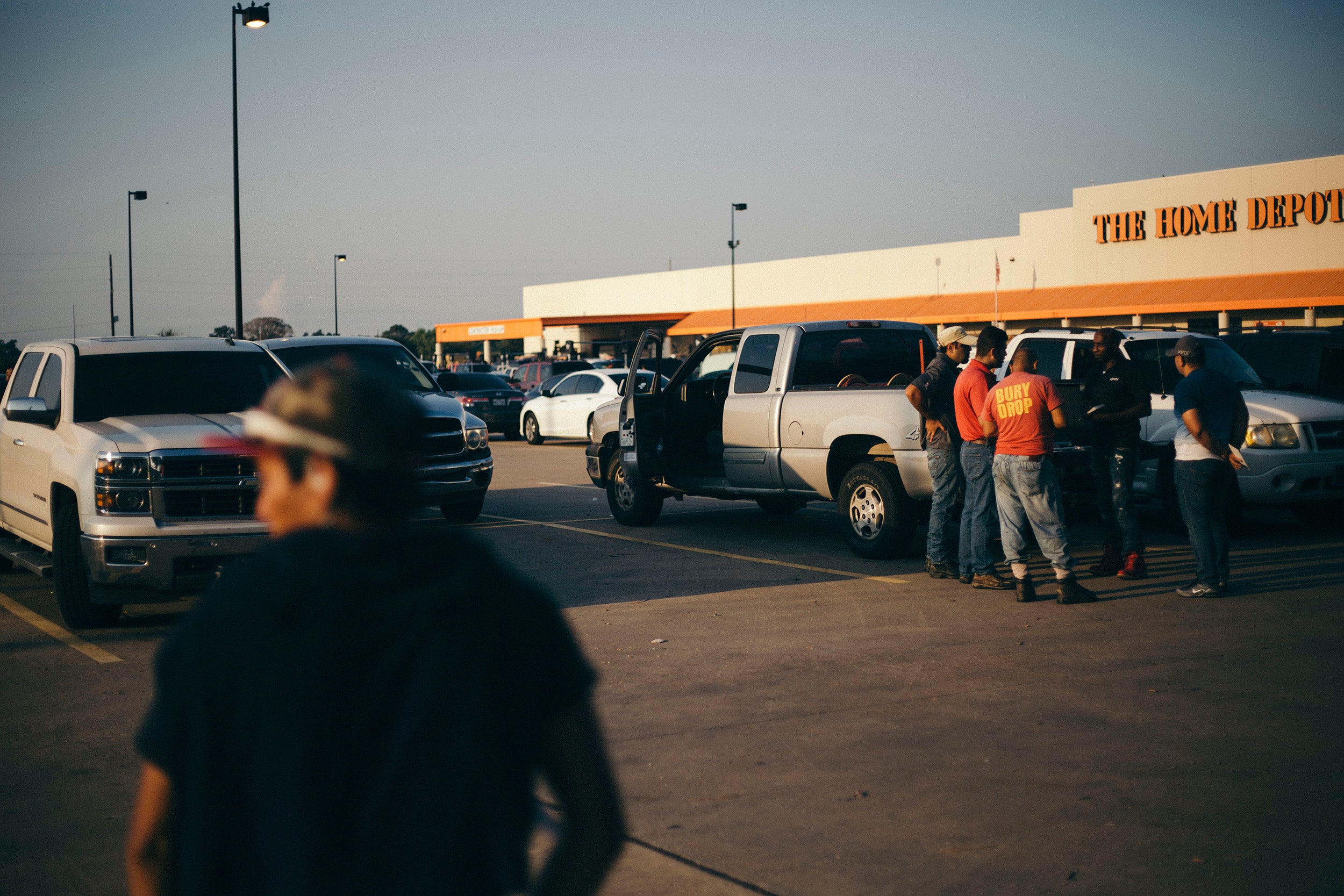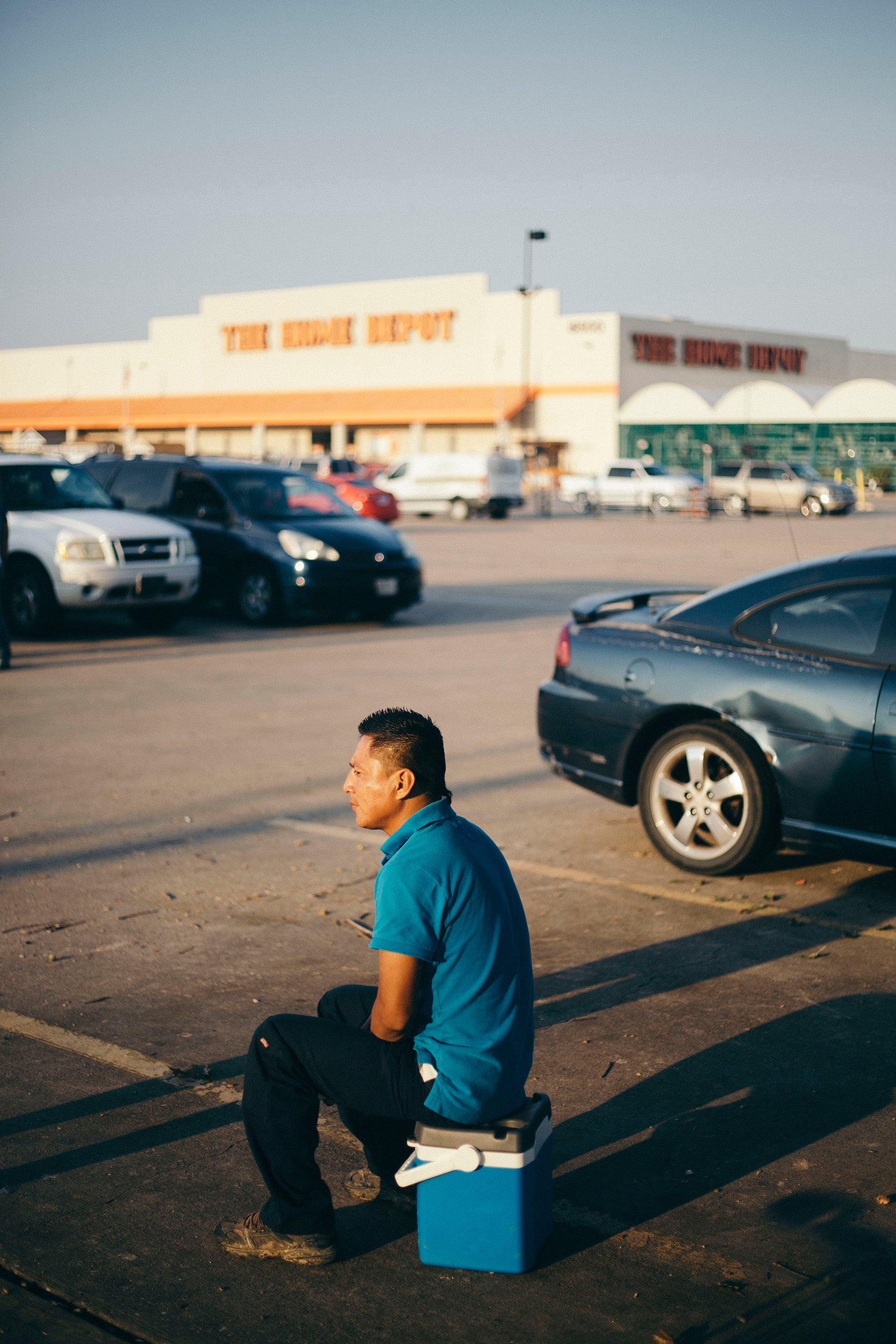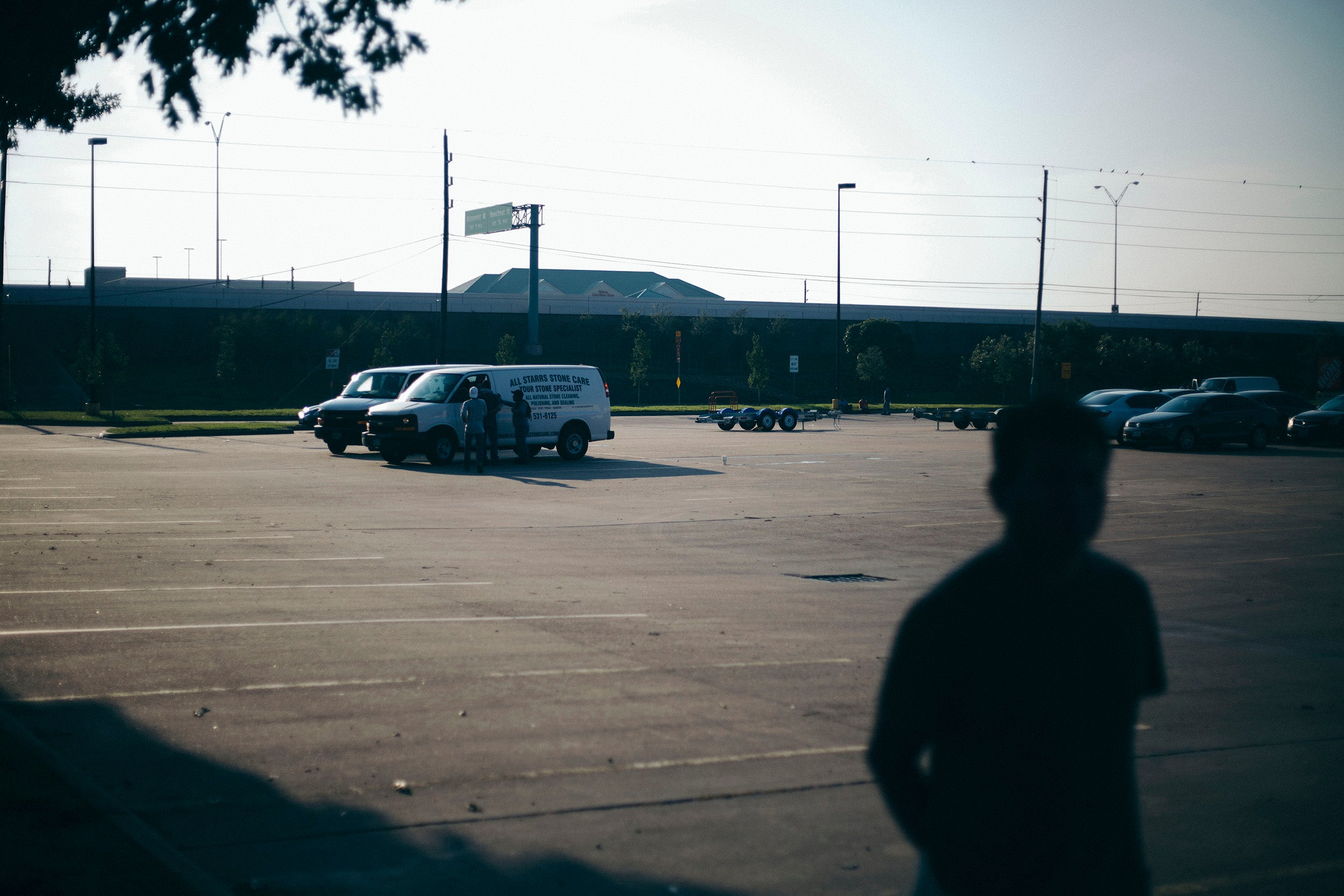‘If they deport all of us, who will rebuild?’ Undocumented workers could be key to Texas and Florida recovery
An army of workers will be needed for the clean-up and rebuilding after Hurricane Harvey and Hurricane Irma. The unexpected demand for labour may spur a showdown over immigration reform – but it also presents an opportunity to solve a problem while advancing social justice

Everywhere Samuel Enríquez looks, he can see the work that needs to be done. But because he is in the United States illegally, he knows he can't earn an official paycheck in this city's recovery.
The carpenter from El Salvador sits on a curb outside a home improvement store, hoping a passer-by will offer $10 an hour to help rip out sewage-soaked carpets or a rotting dry wall. Having lived in the US for a year, he believes Texas is as good a place as any to seek refuge, because that's where the work is now, even if some government officials want him and others like him to leave the country.
“If they deport all of us, who will rebuild?” says Enríquez, 36, waiting along with about two dozen other labourers seeking work. “We do more for less.”
It will take an army of workers to reconstruct a vast swath of southeast Texas, including the sprawling metropolis of Houston, that was devastated by Hurricane Harvey. Whether the region can do it without fully embracing workers like Enríquez will soon be put to the test – with reverberations that could be felt nationwide.
Under President Trump, authorities in Texas have been bearing down on illegal immigrants. Until a judge blocked the measure last week, they threatened to enact a new state law that would outlaw sanctuary cities. Texas has been leading a group of 10 states demanding that Trump end the Obama-era Deferred Action for Childhood Arrivals program, or Daca, which granted reprieves from deportation to nearly 800,000 undocumented immigrants who came to the US as minors.
It is a harsher landscape for those in the country illegally than it was 12 years ago, when the Gulf Coast faced the similar-size task of cleaning up from Hurricane Katrina. Eight days after that storm made landfall, President George W. Bush bowed to pressure from construction firms and relaxed worker ID rules. By some estimates, that allowed more than a quarter of all government-paid recovery jobs to go to illegal immigrants.
But weeks after Harvey struck Texas with record-setting rains and caused unprecedented flooding, the Trump administration has made no similar proclamation. Worse, immigrant rights groups say, federal authorities have sent conflicting signals about whether they might start simply detaining and deporting those flushed out into the open by the storm.

Republican Lamar Smith, who was critical of Bush's decision, said in a statement recently that he sees even greater challenges in recovering from Harvey. “But that does not mean federal immigration laws should be ignored. Nor should regulations that require federal contractors to verify legal work authorisation of their employers,” he said. “These policies were put in place to protect American workers and taxpayers.”
More than 200,000 homes sustained damage in the storm, including more than 13,500 that were destroyed, according to early local estimates that don't provide solid numbers for some of the hardest-hit areas. Leaders in the construction industry have begun sounding alarms that there will not be enough American-born workers to rebuild as quickly as needed.
“If they would relax the rules, honestly, that would be great, we could use it,” said Jeffrey Nielsen, executive vice-president of the Houston Contractors Association, whose members include the city's largest firms that build roads, bridges and other public works.
Nielsen said that even before Harvey hit, almost every member of the association was grappling with a shortage of workers. With a crushing list of jobs growing by the day, thousands need to be hired – and fast. Nielsen said he and other construction industry officials were told at a weekend briefing that roughly 30 percent of all roads in and around Houston will remain impassable without some construction work.
“The truth is, there are not a lot of people jumping up and down to do civil construction work in Texas. It's hot, and these jobs are pouring concrete or, worse, hot asphalt,” Nielsen said. “That's the reality of it, and we need more people than ever.”
There are plenty in and around Houston who might consider taking on the work, which can pay $20 an hour or more, if ID requirements were relaxed, construction industry officials say.
The Houston metropolitan area has the third-largest illegal immigrant population in the country, about 575,000 people, according to a Pew Research Centre report this year. Those workers already make up roughly a quarter of all construction labourers citywide, according to the study. Some estimate it could be closer to half.
The federal government has begun signing massive contracts for debris removal, roofing work and other emergency efforts, and none of Houston's unauthorised immigrant population could pass worker verification guidelines required of federal contractors.
At a news briefingrecently, White House homeland security adviser Tom Bossert tried to allay fears that Houston's immigrants would be rounded up when they sought help at shelters. The administration, he said, was encouraging people to seek lifesaving help if they need it and wouldn't “let somebody starve or die of thirst or exposure.”
But Bossert also was clear that the extent of the government's leniency for illegal immigrants ends there. “There's no real wavering here, and it's pretty clear about our position on immigration,” he said. “I don't think there's going to be a lot of benefits going out to illegal immigrants in terms of the American taxpayer.”
On the ground in Houston, the reality is different. Workers are needed urgently, and in Harvey's wake, a shadow economy of off-the-books hiring will only expand, putting workers at risk of exploitation and robbing the state and federal government of tax dollars. In eastern Houston, Guillermo Herrera's banquet hall received about two feet of water after the west canal of Greens Bayou swamped the nearby community of mobile homes and cottages.
The hall was full of mud, the beer fridge had overturned, and the drywall stank, Herrera said. But despite the storm and flooding, one of his clients refused to cancel a Saturday night wedding ceremony planned for 600 guests. To make good on the contract and keep his business afloat, Herrera turned to his employees and their relatives to get the job done.
“I didn't care where they came from,” said Herrera, 55. “We needed the help.”
By midday Saturday, the tile floor was sparkling, the tables and their gaudy glass centrepieces were in place, the septic tank was back in working order, and the mariachi band would soon arrive.
Without undocumented workers, “there was no damn way” to do the job, Herrera said, adding that after the nuptials he planned to close the hall for two weeks for a more extensive rehab – one that will likely require hiring more undocumented workers.
Dave and Josephine Bushnell travelled from Louisiana to help their daughter clean up after the flooded San Jacinto River left nearly six feet of water inside her two-storey home in Humble, Texas. The couple and a crew of local church volunteers are doing some initial work, but soon they will need more specialised help for wiring, reassembling walls and putting in new floors. Would they hire day labourers to help?
“Oh yeah. They need the help too. The government helps us, we help them, and all of us help the economy,” Dave Bushnell said, pointing to a crew of three men pulling up a tree stump at an adjacent home. “You see how hard they work. They've probably lost everything too, but they can't sit and wait for a handout. They've got to work.”

But to be part of the federal government's recovery effort, it's a different process entirely. Often, an early step is for an employer to check the US Citizen and Immigration Services E-Verify website, which makes sure a worker is a citizen or a foreign one with the necessary authorisation to draw a paycheck.
Nielsen said his crews of road workers have been getting walk-ups every day. “We tell them we E-Verify, and half of them just turn around and walk away,” he said.
“We are undoubtedly going to need immigrant workers to rebuild Houston,” said Kevin Appleby, director of policy for the nonprofit Centre for Migration Studies of New York. “It is clear that immigrants, including those without status, helped to rebuild New Orleans.”
Stan Marek, chief executive of Marek Construction in Houston, sees the damage left by Harvey as big enough to hopefully reset the national debate over illegal immigration.
He and other contractors want a permanent solution that will absorb the existing workforce and train them for the kinds of jobs that Houston and other parts of Texas will need. The storm, Marek said, provides an opportunity to solve an immigration problem in the state while advancing social justice.
“With some supervision and some training, we could kick-start this whole thing to basically integrate these people into society,” Marek said. “Let's take them out of the shadows and give them the protection of our laws.”
Roberto Benavidez, 45, a Nicaraguan, has been thinking the same thing as he paces in front of a Home Depot in West Houston looking for odd jobs. “For the country to rebuild Houston, it will need amnesty for immigrants,” Benavidez said. “I get it. It seems like we are busting in the door of your house and asking to stay, but in reality, we are knocking on the door and offering a service.”
For a larger fix, advocates say Bush's decision after New Orleans can't be looked at as a model. In September of 2005, the Department of Homeland Security waived worker identification requirements for “victims” of Katrina for 45 days. Critics said it was impossible to determine who was a victim, and it let illegal immigrants from across the country descend on New Orleans and be hired as subcontractors.
Appleby said he sees three likely scenarios under Trump: “Either he does not waive and continues to be strict, or he does not waive but also does not enforce, or he relaxes regulations,” he said.
The most likely, Appleby believes, is for the administration to “wink and nod” and to not conduct raids of construction companies in the Houston area for some period of time.
In the meantime, Emelda, who cleans houses in Houston, said she is getting ready for an uptick in work, and still holds hope something good can come out of Harvey. “Through all this hurt, we've become, as a city, one hurting heart. The pain of one is the pain of all,” said Emelda, who spoke on condition her full name not be used because she fears deportation.
“I feel that through all of this, God is talking to us. And He's saying a lot, showing us we need to have compassion and patience with one another.”
© Washington Post
Join our commenting forum
Join thought-provoking conversations, follow other Independent readers and see their replies
Comments
Bookmark popover
Removed from bookmarks